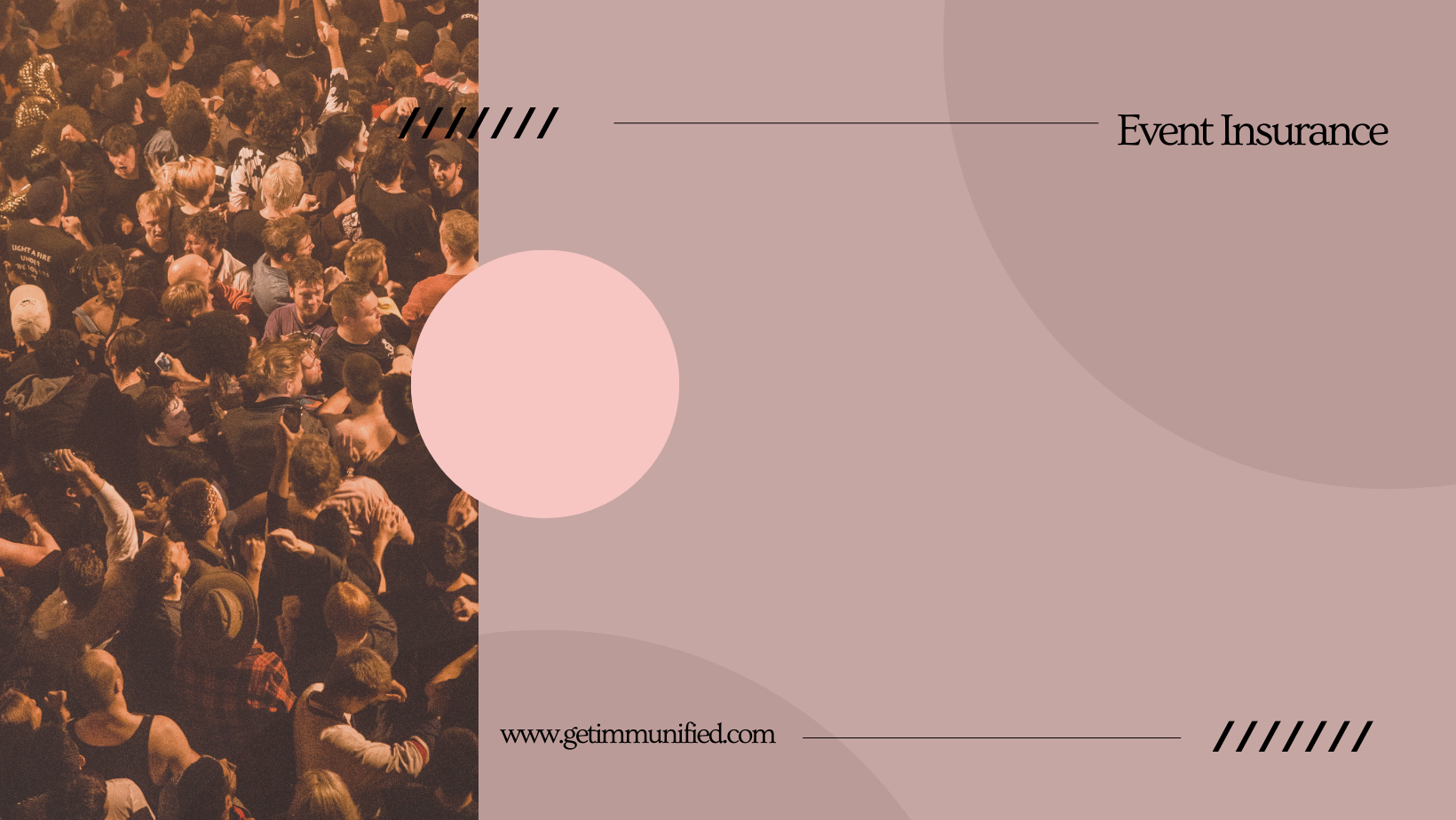Event insurance has proven to be an effective way for you to tackle and mitigate certain risks that surface during event planning.
We all know that planning an event can be a difficult experience, be it a wedding, a festival, an office gathering, or many more. Amidst all the excitement and preparations, it’s crucial to consider the unexpected. That’s where event insurance comes into play.
In this article, we will be providing you with adequate and thoroughly researched information concerning event insurance. Just stick around.
Before we delve into every other detail, let’s first understand what event insurance is really all about.

What is Event insurance?
This is a type of insurance that covers the financial losses that you face when hosting an event. It protects you from losses caused by some unfriendly situations like weather-related issues, property damage, etc.
Also, it is a type of insurance coverage that is designed to protect individuals and businesses from financial losses that may arise due to unexpected circumstances.
Are you following? Now that we’ve gotten an in-depth idea of what this insurance is all about, let’s see what is covered by event insurance.
What Does Event Insurance Cover?
The following are covered by event insurance:
- Cancellations and Postponements
- Liability Protection
- Vendor Non-Appearance
- Property Damage
- Illness or Injury
- Weather-Related Issues.
1. Cancellations and Postponements
One of the primary reasons event insurance is essential is to mitigate the financial risks associated with event cancellations or postponements.
Certain factors can contribute to an event being shifted. These factors may include extreme weather, illness, or other unforeseen circumstances.
So, canceling or rescheduling an event can lead to significant financial losses and that is where event insurance comes in.
2. Liability Protection
Liability claims can be a nightmare for event organizers. Injuries, property damage, or accidents that occur during an event can lead to costly legal disputes.
Event insurance provides liability protection, covering legal expenses and potential settlements and offering peace of mind to event hosts.
3. Vendor Non-Appearance
You might have planned your event in a way that heavily relies on your vendors. In a situation where a vendor fails to show up or deliver as promised, it can lead to chaos and disappointment among attendees.
In such cases, event insurance can provide compensation for additional expenses incurred to find replacement vendors or to cover losses caused by vendor no-shows.
4. Property Damage
There is a high chance that you will be renting some equipment during an event. In a situation where your rented equipment gets damaged or stolen, event insurance can take care of the replacements.
5. Weather-Related Issues
Outdoor events are susceptible to weather disruptions. Event insurance can provide coverage for weather-related damages or losses, allowing you to recover costs associated with venue or equipment damage.
6. Illness or Injury
In a situation where an important personality or participant, such as a speaker, performer, or guest of honor, happens to fall sick or injured, then your event insurance can pay you back for your expenses.
Just like other insurance types, there are various kinds of event insurance, which we will be discussing below.
Types of Event Insurance
- Cancellation Insurance
- Event Liability Insurance
- Special Event Insurance
- Event Equipment Insurance
- Workers’ Compensation Insurance.
Event Cancellation Insurance
This is one of the most common types of event insurance. It covers financial losses that occur if an event is canceled or postponed due to unforeseen circumstances.
It can cover things like lost deposits, venue fees, and non-refundable travel expenses.
Event Liability Insurance
This is an aspect of event insurance that takes care of the financial risks that are associated with accidents or injuries that occur during an event.
It can cover things like medical expenses, legal fees, and damages awarded in a lawsuit. In a simple form, we can just say that liability insurance protects against claims of bodily injury or property damage arising from the event.
Special Event Insurance
This type of insurance is designed for one-time events, like a festival, conference, or gala. It can cover things like cancellation, liability, and equipment.
Unlike event cancellation insurance, it doesn’t need to be purchased as part of a package. It can be purchased on its own.
Event Equipment Insurance
This type of insurance covers the cost of repairing or replacing event equipment if it’s damaged or stolen. The equipment can include things like sound systems, lighting, and stages. It can also cover rented equipment, like tables and chairs.
Event workers’ Compensation Insurance
This type of insurance covers medical expenses and lost wages for workers who are injured while working at an event. It can also cover legal fees and damages awarded in a lawsuit. This type of insurance is required in some states, and it’s a good idea even if it’s not required.
Non-Appearance Insurance
This type of insurance covers financial losses if a key person or performer is unable to attend an event. For example, if a celebrity is scheduled to perform at an event but can’t make it due to illness or another reason, non-appearance insurance can cover the costs of replacing them. Is that clear?
The above are the types of event insurance: They are all important, and we will encourage you to carry out adequate research before purchasing coverage on any of them.
There are certain factors that play several roles when considering event insurance. Let’s now look into those factors.
Factors that Affect the Costs of Event Insurance
The following are the factors that affect the cost of event insurance:
- Type of event
- Location of event
- Amount of Coverage
- Size of event
- Length of event
- Number of attendees.
Overview of the Factors that Affect the Cost of Event Insurance
1. Type of Event
The type of event is one of the biggest factors that affects the cost of event insurance. Let’s take for instance, a music festival, which typically costs more to insure than a small corporate conference.
This is because there’s a greater risk of injury or damage at a music festival, with so many people and activities taking place.
2. Location of Event
The location of the event can have a big impact on the cost of event insurance. For example, an event held in a hurricane-prone area will typically cost more to insure than an event held in a less risky location.
This is because there’s a higher chance of the event being canceled or disrupted by a hurricane.
3. Amount of Coverage
This is one of the most important factors in determining the cost of event insurance. The more coverage you need, the higher the cost will be.
4. Size of event
This has to do with the number of people attending the event. The larger the event, the higher the cost of insurance will be.
5. Length of the Event
The length of an event is another important factor that affects the cost of event insurance. The longer the event, the higher the cost will be.
This is because there’s a greater chance of something going wrong over a longer period of time. A one-day event is generally less expensive to insure than a multi-day event.
6. Number of Attendees
This refers to the number of people who are expected to attend the event. The more attendees there are, the higher the cost of insurance will be.
Are you ready to purchase event insurance already? Okay, here is a brief guideline on how to do so.
Cost of Event Insurance
The cost of event insurance can vary widely, depending on the factors that we have discussed earlier. As a reminder, these factors include the type of event, the location, the number of attendees, etc. On average, event insurance can cost anywhere from $250 to $285.
How to Purchase an Event Insurance
Below is a step-by-step process on how to purchase event insurance:
- Firstly, you need to assess your specific needs
- Understand the different types of coverage available
- Compare quotes from multiple insurers
- Read the fine print of each policy
- Choose a policy that offers the right coverage at a price you can afford.
FAQs on Event Insurance
What is event insurance?
Event insurance is a type of insurance that covers the financial risks that have to do with hosting an event. It protects you from losses caused by things like event cancellations, weather-related issues, property damage, etc.
Who needs event insurance?
Event insurance is typically required by venues, and it's also recommended for anyone who is hosting an event, whether it's a small, private event or a large public event. This is because it can help protect against financial losses that may occur due to unforeseen circumstances.
How much does event insurance cost?
The cost of event insurance can vary depending on a number of factors, including the type of event, the location of the event, the number of attendees, and the level of coverage required. It's best to get a quote from an insurance provider to get an accurate estimate of the cost
What's the difference between event insurance and general liability insurance?
While event insurance and general liability insurance may seem similar, there are some key differences. Event insurance is designed specifically for events, while general liability insurance is designed for businesses. Event insurance may cover things that general liability insurance doesn't, like cancellation or postponement of an event.
Conclusion
In conclusion, event insurance is a type of insurance that’s designed to protect you from financial losses that may occur due to an event being canceled, postponed, or disrupted.
It is a means of protection for event planners and venue owners, and it can help to ensure that everyone involved in the event is covered in the event of an unexpected incident.
We Also Recommend:
Top 20 Free Pet Insurance For Low-Income Families
How Much Does Landlord Insurance Cost Per Month?
Self-Employed Accident And Sickness Insurance
